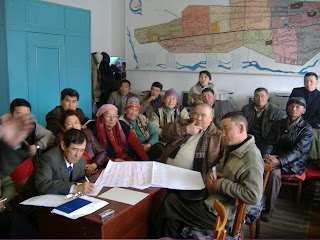 The object of education is not to learn but to unlearn
The object of education is not to learn but to unlearn (Chesterton)
To see what is in front of one’s nose requires a constant struggle (Orwell)
Two nice quotations – the first from the Grey book on studying organisations, the second from Tony Judt’s ill Fares the Land which I read with great enthusiasm. I'll come back to it another day
The book on “studying organisations” finished by recommending eleven books (a football team?) “about the things discussed in the book”. It has encouraged me to try to produce a list of recommended reading for those who want to (a) try to fathom what makes their organisation tick and (b) change it. (As “someone” (!) once said “
philosophers have hitherto merely interpreted the world in various ways, the point is to change it”).
I will need time to make the selection – so I will start today with some of my favourite writers in “the field”; then flag up some criteria for the selection; and, finally, make some initial nominations.
And the books and writers will hopefully do justice to all types of organisations (public; commercial; non-profit)
Obviously a book which someone finds insightful reflects both that individual’s experience and the wider context of that moment or zeitgeist. And it is impossible to keep up with new publications in one field – let alone the several I trespass across......
Writers
My (Eleven) Recommended Books on organisations will almost certainly contain a book from the following writers – although it will be difficult to select just a single book for each.
Robert Greenleaf – one of his books on stewardship
Charles Handy – perhaps not so much his Understanding Organisations as one of his more autobiographical books.
Gods of Management is perhaps a good start.
Roger Harrison – whose
Collected Papers represent a rare study of an organisational developer in action and willing to show how his ideas have changed
Hutton, Will - whose last 3 books (
The State We’re in;
The World We’re in; and
The Writing on the Wall) have been a marvellous exposition of the wider socio-economic and ideological systems which give organisations their legitimacy.
Korton, David –
When Corporations Rule the World (1995) opened my eyes to the history of the commercial company. His later writings are more disappointing (eg
The Great Turning)
Lessem, Ronnie – from whose prolific output it is difficult to choose. I chose
Management Diversity through cultural diversity (1998) in my blog of October 23 about the books which had made an impact on me in the last 20 years.
Criteria
To make the final selection, a book needs to satisfy 4 criteria –
• Offers a richer way of looking at the world – whether by introducing a new perspective or setting out typologies which allow us to understand differences
• Be written clearly and simply
• Be open-minded, non-dogmatic, generous
• Inspire and encourage action
Nominations
First nominations -
Gareth Morgan’s
Images of Organisations - for the way he demonstrates that our thinking about organisations is governed by metaphors (as machine, brain, organism, political systems, instruments of domination, psychic prisons, flux and transformation and cultures)
Then 2 books which each offer typologies of thinking about ways of organising government systems -
Guy Peters
The Future of Governing – four emerging models – which first describes the classic modern assumptions about government which have been challenged in the last 3 decades by "market models", "the Participatory State" , "Flexible Government" and "Deregulated Government".
Chris Hood’s
Art of the State offers four models - hierarchist, individualist, egalitarian, fatalist and is particularly good in exploring their typical policy responses.
Harrison and Bramson’s
The Art of Thinking (1982) suggests that people have very different ways of approaching problems and that we will operate better in teams if we understand what our own style is and that others think in different ways. He offers 5 styles - synthesist, pragmatist, idealist, realist and analyst (and combinations thereof).
Skynner and Clease’s
Life – and how to survive it. A therapist and leading British comic have a Socratic dialogue about the principles of healthy (family) relationships and then use these to explore the preconditions for healthy organisations and societies: and for leadership viz -
- valuing and respecting others
- ability to communicate
- willingness to wield authority firmly but always for the general welfare and with as much consultation as possible while handing power back when the crisis is over)
- capacity to face reality squarely
- flexiblity and willingness to change
- belief in values above and beyond the personal or considerations of party.
Deborah Stone’s
Policy Paradox - which critiques the rationalistic way policy analsis is generally undertaken and then shows the different meanings which can be given to the 4 of the principles governments try to pursue - equality, Efficiency, Security and Liberty. The final part of the book looks at the type of language used by groups for portraying policy problems - symbols, numbers, causes, interests and decisions.
JQ Wilson’s
Bureaucracy – what government agencies do – and why they do it
S Zuboff’s
The Support Economy about which I’ve written in this blog already.




























